Good and bad torture
Torture is commonly associated with historical events that took place in the distant past, and images of torture and punishment resemble practices that arose in the Middle Ages.
Despite their decline by the XNUMXth century, they revived and spread again in many states, and they still take place in the twenty-first century, and, most typically, in the most democratic countries, which the United Kingdom, the United States and Israel call themselves.
By the way, the progressive and tolerant Western society brings new theories under the current torture and even finds them almost moral justification.
Guantanamo
Guantánamo signaled the return of judicially sanctioned torture to the public sphere.
Torture - these are not hooligan bullying by a few bad guys, they are an integral part of the US state military strategy.
Torture and what is legally referred to as “cruel, inhuman or degrading treatment” were sanctioned by the George W. Bush regime's legal experts and governed by bureaucratic documents used throughout the global US prison archipelago.
Torture program.
Drawings made by captive prisoners at Guantanamo Bay who were subjected to "intense interrogation" vividly and disturbingly depict his account of what happened to him.
These are sketches of a Guantanamo Bay prisoner known as Abu Zubaydah, his memory of torture during four years in secret CIA prisons.
These recently released drawings depict specific CIA techniques that were approved, described and categorized in notes prepared in 2002 by the Bush administration, and reflect the perspective of the person tortured there, Mr. Zubayd, a Palestinian whose real name is Zayn al-Abidine. Muhammad Hussein.
One of these sketches depicts a prisoner naked, tied to a rough gurney, his entire body compressed as an unseen investigator floods him with water.
Another drawing shows that his wrists are chained to a bars so high above his head that he is forced to stand on tiptoe, "with a long wound sewn up in his left leg and howls coming out of his open mouth." The other depicts a jailer beating his head against a wall.
This prisoner is not an artist, he made crude and very personal images that embody the essence and emotions that until now have only rarely been portrayed in popular culture as permissible measures of influence on the arrested person.
Water sports.
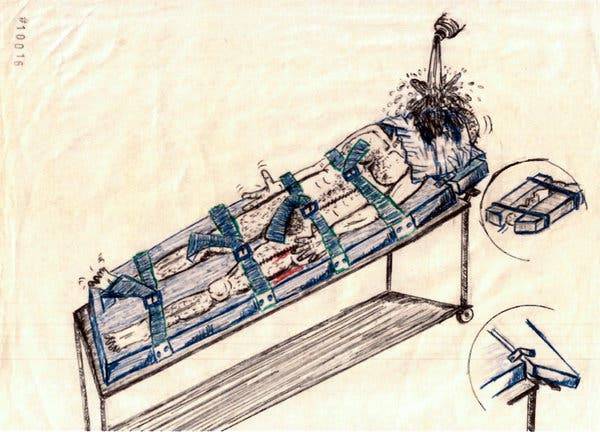
Stress postures.
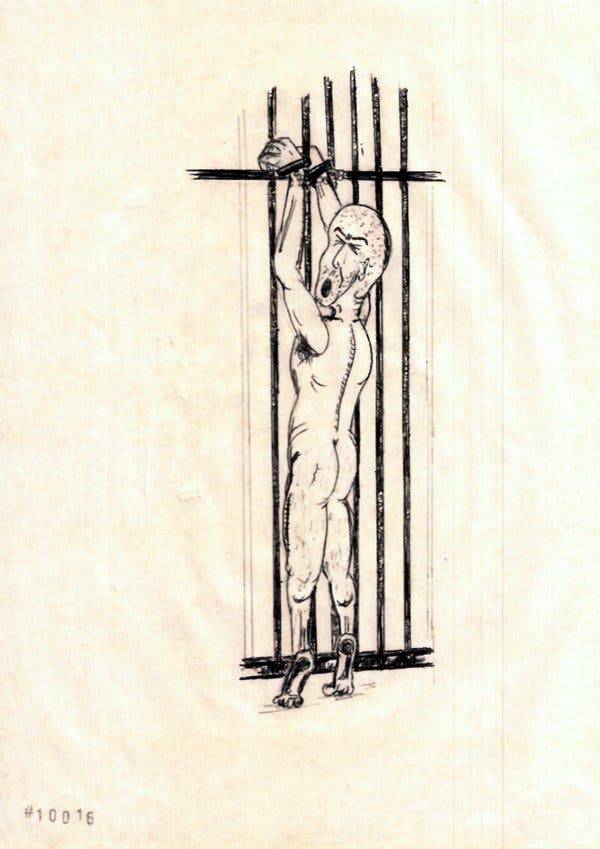
Short shackles.
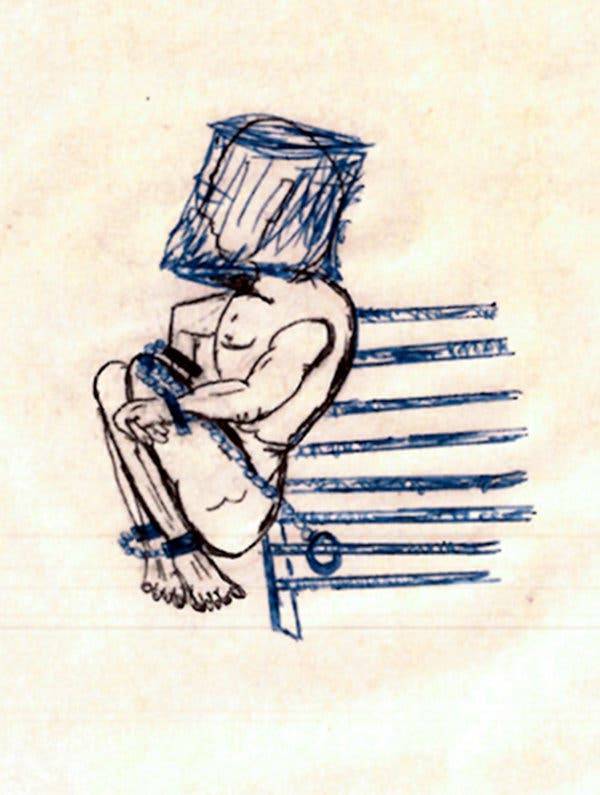
Hitting the wall.
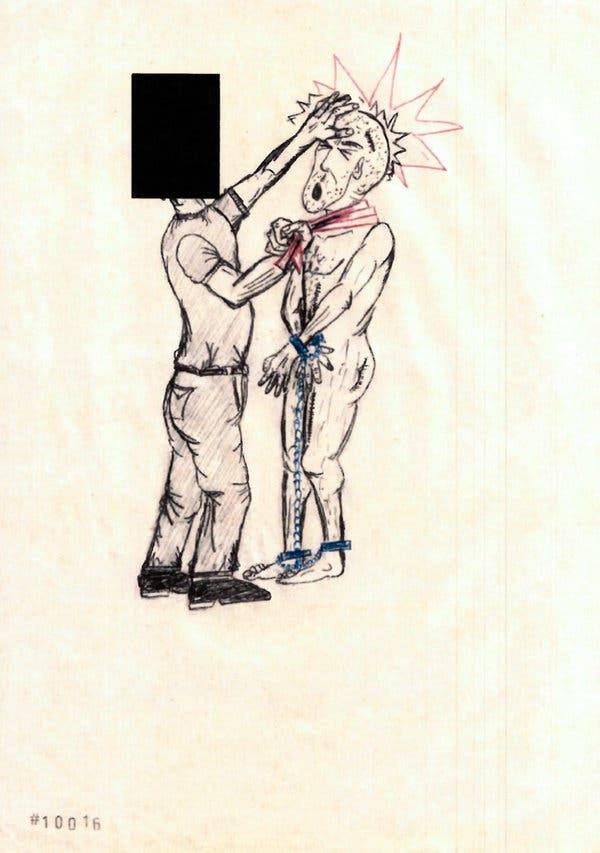
Large prison box.
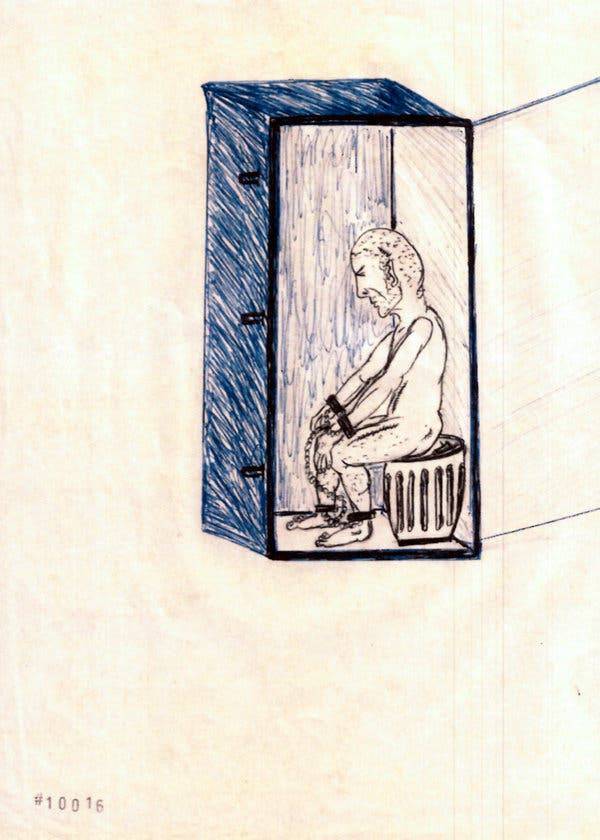
In this drawing, Zubaida is shaved, naked, shackled in such a way that he cannot stand up, and, according to him, is sitting on a bucket that serves as a toilet bowl.
Small confinement cell.
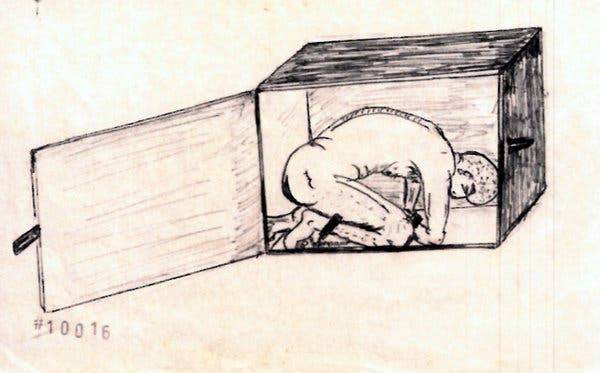
He was immobilized and shackled in the fetal position, as he described it, for "countless hours" undergoing muscle contractions.
Lack of sleep.
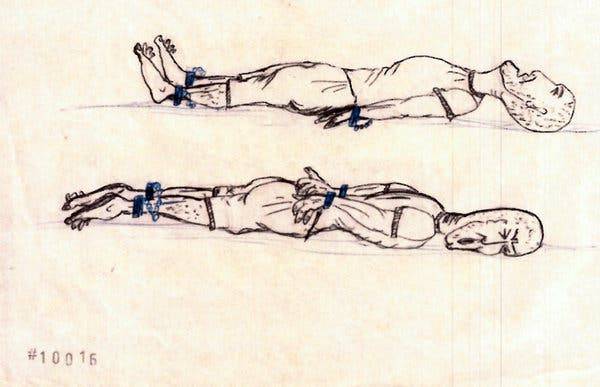
Zubaydah said the agents used "horizontal sleep deprivation", which involved shackling him to the ground in such a painful position that he could not sleep.
History
Antiquity.
Judicial torture was probably first used in Persia by either the Medes or the Achaemenid Empire.
POWs were torn out their tongues, ripped off their skin or burned alive. This served an indirect purpose - to convince the next city to surrender without a fight.
Over time, torture began to be used as a means of correction, causing public horror and sadistic pleasures for the torturers and some spectators, deprived of other entertainment.
The ancient Greeks and Romans used torture for interrogation. Until the XNUMXnd century AD, torture was used only on slaves (with a few exceptions).
After that, they began to be extended to all members of the lower classes (the testimony of a slave was only permissible if it was obtained under torture).
Middle Ages.
Medieval and early modern European courts used torture depending on the crime of the accused and his or her social status.
Torture was considered a legal means of obtaining confessions or the names of accomplices, or other information about the crime, although many confessions were largely invalid due to the victim being forced to confess to severe agony and pressure.
Wheeling.
Torture, also known as Catherine's wheel, was used to slowly kill a victim. First, the victim's limbs were tied to the spokes of a large wooden wheel, which then slowly rotated. At the same time, the executioner simultaneously smashed the victim's limbs with an iron hammer, trying to break them in many places.
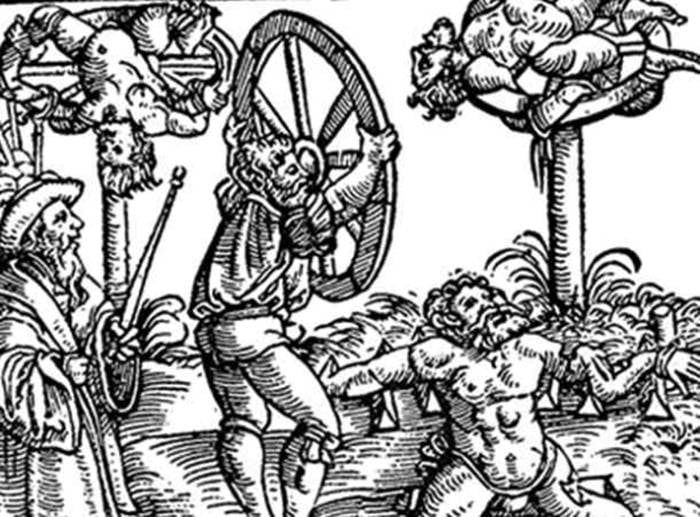
After the bones were broken, the victim was left on a wheel, which was raised to a high pillar, so that birds could feed on the flesh of a still living person.
It is known that in the Middle Ages almost every castle had its own set of instruments for torture. This was allowed by law only if there were already half-proofs or at least denunciations against the accused. Torture was used in continental Europe to obtain corroborating evidence in the form of a confession when other evidence already existed.
Torture The Medieval Inquisition began in 1252 with the papal bull Ad Extirpanda and ended in 1816 when another papal bull banned their use.
Torture did not restore justice; it strengthened the power of the sovereign.
He restored sovereignty, forcing everyone to realize through the tortured body of a criminal his unlimited power. The suffering body of the condemned became the fulcrum for the ritual manifestation of power, revealing both the truth of the crime and the power of the sovereign.
The excess of violence showed the disproportionate power of the triumphant sovereign over those whom he had brought to powerlessness. The trials were held in secret. The accused had no right to know either the charge or the evidence against him. Knowledge was the absolute privilege of the prosecution.
Only the punishment became public.
The torturous executions were usually public, and the engravings depicting the hanged, drawn and quartered English prisoners showed a large number of spectators, as in the paintings of the Spanish auto-da-fe, in which heretics were burned at the stake.
Torture was also used during this period as a remedy, so it was presented in the form of a spectacle to instill fear in the public.
A typical example can be found in LA Perry's History of Torture in England:
They represent a state of thought in which people have long and carefully considered all forms of suffering, compared and combined different types of torture, until they became the most consummate masters of their art, did not use up all the resources of the highest ingenuity on this topic and pursued it with the fervor of passion.
Early modern period.
During the Renaissance, Protestants continued to torture teachers whom they considered to be heretics.
Suspected witches were also tortured and burned, although more often they were expelled from the city, as well as suspected of spreading the plague, which was considered a more serious crime.
In the XNUMXth century, the number of cases of judicial torture declined in many European regions as a whole, thanks to the speeches and books of the then enlightened public opinion spokesmen.
Johann Graefe in 1624 he published the book The Reformation of the Tribunal, a case against torture.
Cesare Beccaria, an Italian jurist, published an Outline of Crimes and Punishments in 1764, in which he argued that torture unjustly punishes innocent people and should not be used to prove guilt.
Вольтер (1694–1778) also vehemently condemned torture in some of his essays.
In England, the jury granted considerable leeway in assessing evidence and conviction based on circumstantial evidence, which made torture unnecessary to extract confessions. For this reason, there has never been an orderly system of judicial torture in England. and their use was limited to political affairs.
While in Egypt in 1798, Napoleon Bonaparte wrote to Major General Berthier regarding the reality of torture as an interrogation tool:
Consequently, the commander-in-chief prohibits the use of methods that are contrary to reason and humanity.
Since 1948.
Contemporary perceptions have been shaped by deep reactions to war crimes and crimes against humanity committed by the Axis and Allied Powers in World War II, leading to strong international opposition to most, if not all, aspects of the practice.
A variety of caveats fill this gap, including denying that the act is torturous in nature, appealing to various laws (national or international), using jurisdictional arguments, and claiming “overriding necessity”.
Throughout history and today, many states have used torture, albeit unofficially. Torture ranges from physical, psychological to political interrogation methods.
Although the ban on torture spread from Europe to most of the world over several decades, by the 1980s the torture taboo had been broken and torture “returned with a vengeance,” thanks in part to television.
Whom are we kidding?
Right.
States that have ratified the United Nations Convention against Torture have a treaty obligation to incorporate provisions into domestic law. Therefore, the laws of many US states officially prohibit torture. However, such legal provisions de jure are by no means proof that the de facto signatory country does not use torture.
Methods and devices of torture
Medieval instruments of torture were varied; these sadistic artifacts are carefully preserved in museums in many European cities, including in Russia: in Moscow and St. Petersburg.

One old English chronicle from the early Middle Ages states:
Psychological torture use non-physical methods that cause psychological distress. Its effects are not immediately apparent unless they change the behavior of the tortured person. Because there is no international political consensus on what constitutes psychological torture, it is often overlooked, denied, and labeled with different names.
Psychological torture is less well known than physical torture and is generally subtle and much easier to hide.
In practice, the distinction between physical and psychological torture is often blurred. Physical torture is the infliction of severe pain or suffering on a person.
On the contrary, psychological torture is directed at the psyche with deliberate disturbances of psychological needs, along with deep damage to psychological structures and the destruction of beliefs that underlie normal sanity. Tormentors often use both forms of torture in combination to exacerbate the associated effects.
Psychological torture also includes the deliberate use of extreme stressors and situations such as mock executions, violation of deep-rooted social or sexual norms and taboos, prolonged solitary confinement, and threats of violence against immediate family members.
Since psychological torture does not require physical abuse to be effective, it can cause severe psychological pain, suffering, and trauma with no visible external effects.
Rape and other forms of sexual violence often used as methods of torture for interrogation or punishment.
During medical torture practitioners use torture to judge what victims can endure by applying treatments that exacerbate the torture, or to act as torturers themselves.
Joseph Mengele and Shiro Ishii were notorious during and after World War II for their involvement in medical torture and murder. However, in recent years there has been a drive to end medical complicity in torture through both international and national legal strategies, as well as lawsuits against individual doctors.
Pharmacological torture Is the use of drugs to cause psychological or physical pain or discomfort.
Tickling torture Is an unusual form of torture that has nevertheless been documented and can be both physically and psychologically painful.
In Japan, according to historians, "merciless tickling" was also practiced against offenders.
A similar method was used in ancient Rome. The victim's feet were soaked in a special saline solution, and then the goat was allowed to lick.
At first, the victim laughed, but soon the procedure became unbearable, causing an unprecedented overstrain of all body systems. Historians note that this type of punishment was probably used throughout Europe, although there is no exact information about the number of punished.
Prison torture, widely used in the modern era, are especially sophisticated in the Middle East.
Detention centers operate in Egypt, Iran, the United Arab Emirates, Bahrain and Saudi Arabia, where prisoners are physically and mentally tortured using electric shocks, isolation, beatings, threats of rape and other methods, including tying to a spit and roasting over a fire.
Modernity, American experience
The historical context is important to scrutinize in terms of comparing how it has developed over time from history to the present, to see how modern torture can have very similar patterns and connections to ancient times.
Despite the prohibition of torture, the practice persisted in the XNUMXth and XNUMXth centuries, when the police used it mainly to obtain information.
Currently, the United States routinely tortures its prisoners, either directly through personnel associated with the military, intelligence services, or private contractors, or indirectly by sending prisoners to torture in Egypt, Ethiopia, Jordan, Morocco, Pakistan, Syria, or elsewhere. ...
Torture itself is not a new American practice.
Bush's new policy.
With the exception of two short periods - after the end of World War II and the Cold War, respectively - when American administrations were the driving force in making the prohibition of torture a rule of international law through the Geneva Conventions and the United Nations Convention against Torture, torture has been a feature of American court rulings.
Many Bush administration leaders continued to advocate the use of torture in interrogation long after the program officially ended.
In the aftermath of 11/XNUMX, the US Department of Defense developed an aggressive plan to find out how the attacks happened.
This, in turn, opened the door for inexperienced and unprepared people to develop ill-conceived practices in Guantanamo, Abu Ghraib prison, Bagram and several other places.
Liberal ideology of torture
Torture has been an integral part of the justice system in the West for over two thousand years, and it was not until the late eighteenth and early nineteenth centuries that it gained notoriety. It was an instrument of power and justice, a method of punishment or revenge, and a tool for obtaining information and confessions.
Thus, torture is what the authorities, the legal system, the police use. Torture is a legal practice.
This aspect has not gone unnoticed by the Bush administration.
The regime's lawyers, recruited from the country's leading law schools, used their professional talents to create a legal space in which torture would be tolerated.
In his 2006 presidential address, Bush outlined the liberal ideology of torture with great rhetorical skill.
For this reason, the government has provided military and intelligence services with new "tools" of war. The "most important source" of important military information is "the terrorists themselves." They have "unique knowledge" about future attacks. "Our safety depends on receiving such information." To "win the war on terror," it is necessary to "move these people to an environment where they can be detained, secretly interrogated by experts and, if necessary, prosecuted for terrorist acts."
Bush explained that to protect innocent Americans, he allowed interrogations to use an "alternative set of procedures" that would not be made public for security reasons.
Turn to "pure torture"
Gradually over the past century or so, and especially since the 1960s and 1970s, torture has changed around the world as practitioners increasingly relied on methods and techniques that left no visible traces.
Unlike “scarring techniques”, which physically incapacitate and somehow visually deform the human body, “pure torture” is much more difficult to read on the human body.
These include electrocution, beatings, water torture, dry asphyxiation, extreme temperatures, exhaustion exercises, positional torture, restraints, salts and spices, drugs and irritants, sleep deprivation, noise, and sensory deprivation.
In an accessible, large 2004 survey, Amnesty International “documented allegations of torture and ill-treatment in 132 states - two-thirds of the member states of the United Nations, and in 2005 the organization reported“ documented cases ”of torture in more than half of the Commission's countries. UN Human Rights.
Prohibition of torture
Today, torture is prohibited by international law and the domestic law of most states. By now, the use of torture is criminalized in almost all countries of the world.
In a number of countries, for the very fact of torture (regardless of the consequences), the perpetrator faces long prison terms:
14 years - in Canada;
15 years in France;
25 years in Argentina;
30 years in Guatemala.
In the UK, the use of methods of physical pressure on prisoners was finally banned in 1971 - after it became known about the ill-treatment of suspects in connection with the terrorist organization IRA. Currently, under UK criminal law, torture is punishable by up to life imprisonment.
Vocabulary
Torture does not have a clear legal meaning, in part because there has been no general and systematic attempt to draw a line between “torture” and “non-torture”.
One reason may be that, in international human rights instruments, torture is usually associated with “cruel, inhuman or degrading treatment or punishment”.
Both that and another were generally under an absolute ban. As a result, although some judicial decisions have separated torture from cruel, inhuman or degrading treatment, the legal outcome should formally be the same, but this has not been confirmed in practice.
While most of us intuitively understand what is meant by torture, it is difficult to find a clear and objective definition. This word has deep emotional and political connotations.
Definition of torture.
The Declaration on Torture describes two forms of practice: on the one hand, “torture” itself, and on the other, “cruel, inhuman or degrading treatment or punishment”.
The term “torture” lends a particular stigma to willful inhuman treatment that inflicts very serious and cruel suffering.
In addition to involving a public official, at least with tacit consent, this definition contains three main criteria:
• causing severe physical or mental pain or suffering; with intention;
• and also inflicted by a police officer (or with his or her consent or tacit consent);
• for a specific purpose, for example, to obtain recognition or information.
Geneva Conventions against Torture
The Geneva Conventions also contain certain provisions prohibiting torture and ill-treatment (common article 3 of the Geneva Conventions (common to the four Geneva Conventions of 1949 and Additional Protocol II), prohibiting “violence against life and human being, in particular, killing of all kinds, mutilation, ill-treatment and torture, as well as an infringement on human dignity, in particular, humiliating and degrading treatment “in all circumstances”.
In the Russian translation of the 1984 Convention, the generally recognized international legal concept "torture" was translated by the word "torture", which traditionally has a narrower meaning in Russian. Since 2003, the Russian legislation has its own definition of the concept of "torture". Federal law of December 8, 2003 to art. 117 of the Criminal Code of Russia "Torture" added a note, according to which torture in this and other articles of the Criminal Code of the Russian Federation means "causing physical or mental suffering in order to coerce testimony or other actions contrary to the will of a person, as well as for punishment or in other purposes ".
Thus, the Russian legislator, contrary to the general trend of modern criminal law, refused to criminalize torture as an independent grave crime.
That is, the difference in the words and interpretation of "torture" and "torture" carries a different legal meaning and consequences.
Good torture?
Time bomb scenario.
The "time bomb" scenario was used to try to justify the use of torture in extreme circumstances, out of paramount necessity.
In this ideal scenario, where the suspect is already in custody, the argument is that large-scale human casualties could have been prevented if torture had been permissible in order to obtain the necessary information.
Using standard interrogation techniques, agents cannot force a terrorist to reveal the location of a time bomb.
Some officials advocate the use of torture to force the terrorist to speak. Others argue that torture violates international and US law and is not a reliable way to obtain information.
The time bomb metaphor has been repeatedly used to justify the use of torture in extreme circumstances.
The question is whether this suspect should be tortured in order to force him or her to disclose information that could potentially save many lives.
Many people believe that in such a situation, agents should do whatever they can to find the bomb, including torturing a terrorist.
Time bomb proponents argue that "torture may not be right ... but overkill is worse, so the lesser evil must be tolerated to prevent the greater."
Others strongly disagree.
Some believe that torture is absolutely wrong and the end (saving lives) cannot justify the means (torture).
The cost of harming one person by torture - a person who is guilty of a time bomb conspiracy and therefore does not merit humane consideration - is considered the outweighed benefit of saving many lives.
Many security officials in the US government during the Bush administration followed this logic. They believed that torture, as a method of interrogation, was necessary to protect America from a catastrophic terrorist attack. The torture had to be allowed to stop the great catastrophe.
Treatment of a terrorism suspect.
The methods of torture have indeed changed, and this may explain how it happens in liberal democracies like the United States in this case, where methods of torture included forced standing, electric shock, etc., as well as psychological pressure: methods that do not leave the physical traces.
In addition to physical torture, psychological torture can be used, such as threatening to execute a suspect, holding a gun to his head, threatening to castrate him, telling him that you are going to kill his family members if he does not give you the information you are looking for, and similar methods that, while not causing physical pain, cause mental pain or suffering, even if there is no intent to carry out such threats.
The United States interprets the UN Convention to mean that such infliction of mental pain or suffering must continue to be considered torture.
In some cases, torture may not cause physical discomfort at all: for example, forcing a Muslim to fall to his knees and kiss a cross can be humiliation and torture.
Using truth serum or other mind-altering substances may very well be legal under US law.
An intelligence agency that can use up-to-date knowledge to solve its problems has tremendous advantages over an agency that tortures people in an eighteenth century style.
American psychologists have conducted scientific research on many topics that are closely related to interrogation: the effects of weakness and isolation, polygraph, reactions to pain and fear, hypnosis and increased suggestibility, anesthesia, etc.
On April 16, 2009, the US Department of Justice launched a series of memoranda, led by Bush administration lawyer John Yew, outlining the US legal basis for forced interrogation in Central Intelligence Agency (CIA) prisons.
The memorandum attracted international media attention by describing the various methods of torture proposed by the CIA and the conditions under which a Justice Department attorney considers them permissible. It lists ten techniques:
(1) grabbing attention, (2) fencing, (3) holding, (4) slap (offensive slap), (5) tightness, (6) standing against a wall, (7) tense positions, (8) sleep deprivation, ( 9) insects placed in the chamber, (l0) water shield.
Water board (water shield).
Perhaps the most notorious interrogation technique used in the United States - now called the "water board" - has its roots in medieval torture chambers.
In one technique, the person being interrogated is tied to a board and the board is tilted so that the prisoner's head is immersed in a pool of water.
Alternatively, water is poured down the throat of the detained prisoner.
This simulated execution is terrifying as the struggling suspect is forced to experience the sensation of drowning.
The procedure can be repeated many times (although suspects may need to be revived if unconscious) without leaving any physical bruises or scars.
Torture is a response to an urgent threat.
After the terrorist attacks on the United States in September 2001, torture interrogations of terrorists became publicly available. The call was that the rare use of torture to interrogate key terrorists could thwart terrorist plans of mass destruction.
Experience of the Korean War.
William Hines, then-Pentagon legal adviser, played a major role in promoting and endorsing this kind of practice at the highest level. Most of the ideas he later presented for approval to then-Secretary of Defense, Donald Rumsfeld, came from a program he created for the US military called Survival, Maneuver, Resist, Escape.
In it, US military personnel were instructed on how to physically and psychologically resist torture if captured by an enemy. In part, the program's calculations were based on the history of torture used against Americans during the Korean War. Half a century later, the United States drew on the experience of the enemy against new enemies - suspected terrorists.
Emergencies.
Some American legal scholars have suggested that in emergencies such as so-called bomb cases, judges should be given the power to order “non-lethal torture” on a suspect believed to have life-saving information.
The use of torture in Guantanamo Bay and in secret, so-called "black spots" in the Middle East was clearly based on this assertion. Although the abuse of prisoners at Abu Ghraib went beyond the official purpose of obtaining information, these violations were initiated and legitimized by an official directive to prepare prisoners for interrogation.
Abu Ghraib - a prison in the Iraqi city of the same name, located 32 km west of Baghdad. The infamous Abu Ghraib prison since the days of former Iraqi leader Saddam Hussein was turned by the Americans after the invasion of Iraq into a detention center for Iraqis accused of committing crimes against the forces of the Western coalition.
At the end of April 2004, 60 Minutes II on the CBS channel aired a story about the torture and abuse of prisoners in Abu Ghraib prison by a group of American soldiers.
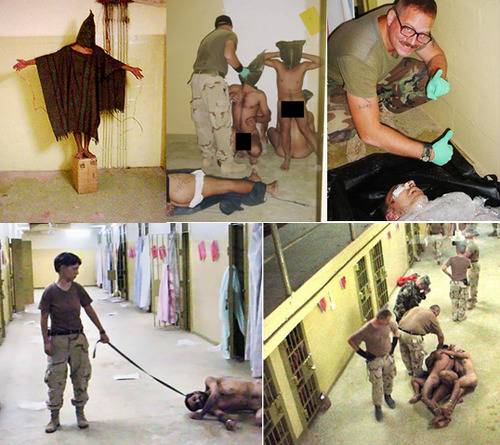
The plot featured photographs that were published in The New Yorker a few days later. This became the loudest scandal around the American presence in Iraq.
In particular, the prisoners said:
Torture with someone else's hands.
The United States has also transferred prisoners of war and suspected terrorism to the military and intelligence forces of countries with less than favorable human rights records:
Pure torture.
The "scientific" technologies approved by the CIA were methods of pure torture, that is, physical methods that leave no trace: electric shock, genital torture, sensory deprivation, watering, fear, psychoactive drugs, stress positions, sexual humiliation, etc. and beatings with rackets, sandbags, electric batons, or other objects that, when used correctly, would hurt without leaving a trace.
For the CIA, the scientific approach had a twofold benefit: it was more effective and denied the tortured person the opportunity to share their experiences: the torture story requires visible scars to confirm.
American congressmen were quite critical of the torture activities of the CIA.
Main conclusions from a condemning report by the US Senate Intelligence Committee regarding the methods of detention and interrogation used by the Central Intelligence Agency (CIA) in the aftermath of the September 11, 2001 attacks:
1. The CIA's use of its sophisticated interrogation techniques was not an effective means of obtaining intelligence or a way to enlist cooperation with detainees.
2. The CIA's justification for using its advanced interrogation techniques was based on inaccurate claims of their effectiveness.
3. Interrogations of detainees by the CIA were brutal and far worse than the CIA imagined it to politicians and others.
4. The conditions of detention of the CIA detainees were harsher than the CIA presented it to politicians and others.
5. The CIA has repeatedly provided inaccurate information to the Department of Justice, which has prevented proper legal analysis of the CIA's arrest and interrogation program.
6. The CIA actively avoided or obstructed Congressional oversight of the program.
7. The CIA obstructed effective oversight and decision-making by the White House.
8. CIA operation and program management have complicated and in some cases obstructed national security missions of other executive agencies.
9. The CIA obstructed oversight by the CIA's Office of the Inspector General.
10. The CIA coordinated the provision of classified information to the media, including inaccurate information about the effectiveness of the CIA's improved interrogation techniques.
11. The CIA was still unprepared when it began its program of arrest and interrogation more than six months after receiving its custody authority.
12. The CIA's management and implementation of its detention and interrogation program was deeply flawed throughout the program's life, especially in 2002 and 2003.
13. Two contract psychologists developed improved CIA interrogation techniques and played a central role in the operation, evaluation and management of the CIA's arrest and interrogation program. By 2005, the CIA had overwhelmingly transferred operations related to the program.
14. CIA detainees were subjected to coercive interrogation methods that were not approved by the Department of Justice and were not sanctioned by the CIA headquarters.
15. The CIA did not maintain an exhaustive and accurate record of the number of persons it detained and detained persons who did not meet legal standards of detention. CIA statements about the number of people detained and subjected to enhanced interrogation methods were inaccurate.
16. The CIA was unable to adequately assess the effectiveness of its improved interrogation techniques.
17. The CIA rarely reprimanded or held personnel accountable for serious and material misconduct, misconduct, and systemic and individual management errors.
18. The CIA has marginalized and ignored numerous internal criticisms, criticisms and objections regarding the operation and management of the CIA's arrest and interrogation program.
19. The CIA's arrest and interrogation program was inherently volatile and effectively ended by 2006 due to unauthorized disclosures in the press, reduced cooperation with other countries, and problems with law and oversight.
20. The CIA's arrest and interrogation program damaged the reputation of the United States in the world and resulted in other significant monetary and non-monetary costs.
What laws prohibit torture?
Several international treaties prohibit torture in all circumstances, including the Fourth Geneva Convention relative to the Protection of Civilian Persons in Time of War, Article 5 of the Universal Declaration of Human Rights, Article 7 of the International Covenant on Civil and Political Rights (“IPPC”) and the UN Convention against Torture and other cruel, inhuman or degrading treatment or punishment ("UN Convention"). These conventions usually impose an absolute prohibition on the use of torture and other cruel, inhuman or degrading treatment or punishment.
However, it is clear that "no exceptional circumstances, be it a state of war or the threat of war, internal political stability or any other state of emergency, can justify torture."
Thus, the prohibition is absolute, with no exceptions.
Finally, there are a number of non-legally binding UN guidelines, recommendations and codes of conduct that contain relevant provisions and apply to specific groups, such as law enforcement officials, or specific situations, such as places of deprivation of liberty.
These include:
• Code of Conduct for UN Law Enforcement Officials (1979).
• UN Basic Principles on the Use of Force and Firearms weapons law enforcement officials (1990).
• UN Standard Minimum Rules for the Treatment of Prisoners (1957).
There are also a number of codes of practice and guidelines on this subject.
It is also worth mentioning in this context the OSCE Handbook on the Prevention of Torture (1999), which was the first attempt to summarize the lessons learned so far.
Regional and International Law on the Prohibition of Torture
Key regional and international treaties related to torture:
• 1950 European Convention on Human Rights.
• International Covenant on Civil and Political Rights 1966.
• 1987 European Convention for the Prevention of Torture and Inhuman or Degrading Treatment or Punishment.
• 1984 UN Convention against Torture and Other Cruel, Inhuman or Degrading Treatment or Punishment.
• 2002 Optional Protocol to the Convention against Torture and Other Cruel, Inhuman or Degrading Treatment or Punishment.
Russia and 14 other states are equally parties to all treaties, with the exception of the Optional Protocol to the 2002 Convention against Torture and Other Cruel, Inhuman or Degrading Treatment or Punishment.
All of these 15 states are parties to the European Convention for the Prevention of Torture and Inhuman or Degrading Treatment or Punishment.
All of these states have ratified the four Geneva Conventions of 1949, and (with the exception of Turkey) all of them are also parties to the Additional Protocols I and II to the Geneva Conventions.
Torture of suspects in the United States or abroad
The Court has indicated on many occasions that investigations must be effective in the sense that they are capable of leading to the establishment of what happened and the identification of the perpetrators.
In addition, investigations must be prompt, impartial and effective.
Although States have various systems for the investigation of torture, including special police or prosecutorial units and independent complaints bodies, in practice there are many obstacles that often lead to impunity.
The US Supreme Court stated:
The Latin maxim salus populi su Supreme alex (the security of the people is the supreme law) and salus republicae su Supreme alex (the security of the state is the supreme law) coexist and are not only important and relevant, but also underlie the doctrine that the well-being of an individual should yield to well-being society.
However, the actions of the state must be “correct and fair”.
His constitutional right cannot be limited in the manner permitted by law, although the method of interrogating such a person will be qualitatively different from the interrogation of an ordinary criminal. "
International practice
Until recently, torture was widespread in Israel, commonplace and legalized. While the state has always denied that it used torture, interrogation techniques known as “moderate physical pressure” were considered acceptable, lawful and necessary in Israel's fight against the Palestinians, which it considered a security threat.
These methods included: relentless lack of sleep; chaining detainees to posts and other structures in torturous positions; beatings; exposure to extreme temperatures, incessant harsh lights and roaring music; and threats to family members.
There is now evidence that torture is being used by military juntas such as the Myanmar junta in countries including Jordan, Syria, Pakistan, as well as by the US military in Guantanamo Bay, Iraq and elsewhere.
Russia's special way
The history of torture in Russia and the USSR has its own characteristics and traditions. This is a topic for a separate study for researchers who are more competent than the author.
We will only discuss recent events.
On October 5, human rights activists from the "Gulagu.net" project reported that they had in their hands an archive of video recordings of about 40 gigabytes, which depicted cases of torture in institutions of the Federal Penitentiary Service of Russia. These videos were recorded by the FSIN officers themselves on service video recorders. Several published records shocked with their cruelty: prisoners were brutally beaten, a mop handle was inserted into the anus, and humiliated.
If regular video recorders are used to record torture, then this is a completely official story., in which employees of the Federal Penitentiary Service participate, and video exchange between institutions indicates the presence of a system.
The people acting within its framework believe that they are doing everything right. In their understanding, it should be so. And they know that if something happens, the system will “cover” them and protect them from punishment.
Human rights defenders describe how it works.
What does the system do?
If he agrees to no longer adhere to thieves' concepts, then the video is simply stored "just in case." And if the prisoner continues to misbehave, the video is used to blackmail him and turn his life into hell.
Immediately before this article was published, the author watched several available videos of torture in a prison hospital in the Saratov region. Only a small part has been made public, but this is enough to understand that not only “problem prisoners” were subjected to bullying and torture, they were massive in nature and, at least, the recorded episodes took place on the direct instructions of the leadership of the FSIN officers or "activists" from among the prisoners.
This story will definitely have a continuation, especially after the publication of the main part of the video archive, which is expected to happen in the coming days.
According to human rights activists, of all the participants in the torture of prisoners, only 15–20 percent of the FSIN officers are tortured on command from above. The remaining 80 percent are people with mental problems and are extremely dangerous to society.
And they transfer their aggression not only to criminal bosses (which is also illegal), but to a lot of prisoners involved in minor offenses, or generally innocent, and sentenced on the basis of judicial errors or crimes.
The FSIN is doing this because other methods of re-education are more complicated and expensive, but this does not mean that they do not exist.
The FSIN is an element of the state system. The presence of a huge amount of aggression in society, from television screens to the actions and rhetoric of the authorities themselves, lead to intra-system aggression.
And this is all interconnected.
Conclusion
The renaissance of torture in the XNUMXst century can be seen as a "strengthening" of power using various strategies of social control. This increase in power, as seen in the “war on terror,” led to the use of torture and total disregard for human rights.
The use of techniques that amount to torture generates pain, suffering, humiliation, fear, anger and, ultimately, hatred, not only in the tortured person, but throughout society.
This hatred can increase the threat of terrorism.
Those who have to use torture often become so violent that they abuse their role, torturing only for pleasure or revenge. When this happens, no one is immune.
The only way to protect people is to treat everyone as having fundamental human rights that no government, group or individual can legally take away. If this rule is applied consistently, justice will prevail.
It is clear that this is a declaration of justice. And life will always make adjustments.
It means that not everything is so smooth in the Danish kingdom and in all other states, including Russia.
This phenomenon is adaptable to the country and the type of government, its needs and goals, the "war on terror" clearly demonstrated how governments have found it possible to justify the use of torture where the terrorist is considered to be not subject to the law, which therefore allows responding him in an illegal way.
Moreover, the label of a terrorist can be hanged arbitrarily, without any logical or legal justification, which justifies further physical and psychological torture. The presence of a huge amount of aggression, from television screens to the actions and rhetoric of the authorities themselves, lead to intra-system aggression.
This is contradictory and hypocritical.
Torture is not only unethical and contrary to true democratic values, but also to the human ideal that claims to be the crown of the creation of the Universe.
What kind of crown?
According to divine and cosmic criteria, mankind, in terms of the manifestation of aggression towards its own kind at all levels from state to everyday life, can be recognized only conditionally or potentially reasonable.
PS
Returning to the topic of the previous article by the author about Artificial intelligence (AI) and its dangers...
What kind of AI can create a state with such morality and ideas about acceptable methods and practices of government and violence?
The question, of course, is rhetorical.
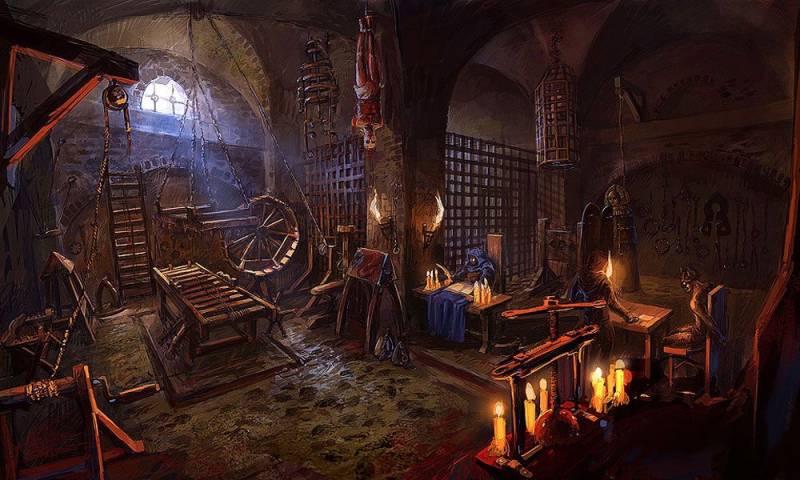


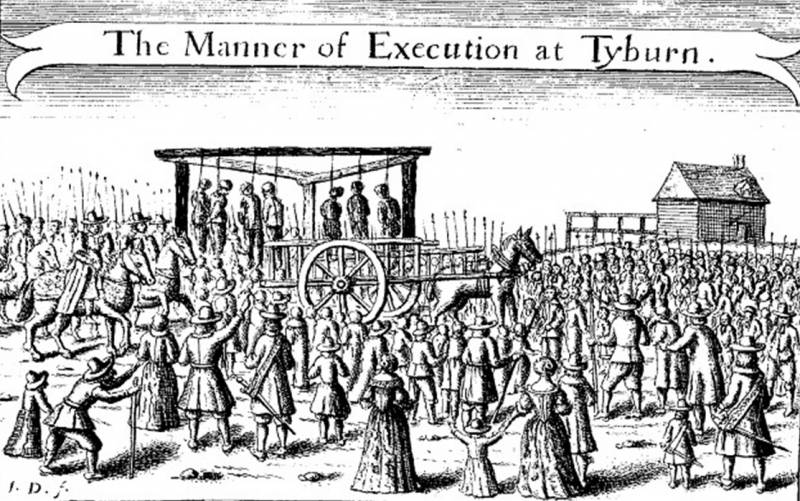


Information